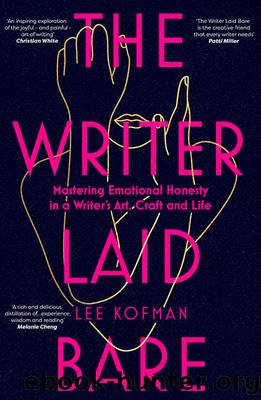The Writer Laid Bare by Lee Kofman

Author:Lee Kofman
Language: eng
Format: epub
Publisher: Ventura Press
Published: 2022-03-30T00:00:00+00:00
LANDSCAPES OF OUR MINDS
The artist Mark Chagall, a Russian-born Jew like myself, fled the Soviet revolution when he was thirty-five and lived the rest of his long life in France (apart from several years in America during the Second World War). Yet his art remained haunted by Vitebsk, the town where he was born, spent his formative years, and met Bella, his first wife and muse. Vitebskâs cows and roosters, violinists and rabbis, wedding processions and lopsided houses dominate Chagallâs canvases. Even in his depiction of the Eiffel Tower, Chagallâs iconic floating lovers, having made their way from Vitebsk to Paris, hover above Franceâs most famous structure.
Not once was Chagall criticised for his preoccupation with his past. But, as he wrote in his recollections, he simply couldnât help himself, and I applaud him for that, for remaining true to the subject that possessed him. Geography can arouse passions, or hatreds, strong enough to power an artistâs oeuvre. In literature, think of Elena Ferranteâs Naples, Lawrence Durrellâs Alexandria, Tim Wintonâs Western Australian coast.
Geography has been my muse too, though I am not faithful to just one location, probably because of my Wandering Jew history. When I am not moving countries or cities, I move neighbourhoods. Perhaps it is because place for me has always been conditional, impermanent, that the geography of my past has congealed into a myth in my mind, and personal mythology makes for a powerful writing subject. So here I go, writing and writing about Siberian towns choked with coal and snow. About Odessa smouldering with lilac and roasted chestnuts. About the beaches of Ashdod littered with joint butts and beauties. About Tel Aviv the dancing queen, and the blue shadows and spiderwebs of the Australian bush, and the chic of Melbourneâs jazz clubs, bookshops and trams.
Even when place isnât the subject, in powerful literary works it usually has a strong presence. At the very least, it is the frame that contains the story, giving context to its events and grounding characters in specificity. It contributes to the atmosphere of the narrative, imbuing it with certain cadences. A love story would have a different feel to it depending on whether it is set in a desert or on the coast. The Australian philosopher Raimond Gaita describes, in this vein, the crucial role of place in the writing of Romulus, My Father, his memoir of his childhood in rural Victoria:
If the landscape had not been important to me, if I did not love it as I still do, I could not have written the book that I did . . . The entire tone and mood of the book would have been different, even, I think, the rhythm of its sentences . . . I hoped that the events and the characters . . . would be bathed in the light and colours of that landscape . . . The colours of the summer landscape were also the colours of our lives.
*
Writing imbued with the colours and light of a certain place immerses the reader by engaging their senses.
Download
This site does not store any files on its server. We only index and link to content provided by other sites. Please contact the content providers to delete copyright contents if any and email us, we'll remove relevant links or contents immediately.
Creating Short Fiction: The Classic Guide to Writing Short Fiction by Damon Knight(97)
Inside the Writers' Room by Christina Kallas(92)
Creating Unique Storyworlds: Essential tips and techniques for fiction writers (Writing tools Book 1) by Sussu Leclerc(90)
On Being a Writer by Charity Singleton Craig(71)
Retention and Resistance : Writing Instruction and Students Who Leave by Pegeen Reichert Powell(68)
Rifts - World Book 14 by New West OCR(67)
The Book of Dialogue: How to Write Effective Conversation in Fiction, Screenplays, Drama, and Poetry by Lewis Turco(66)
Novel Ideas: Contemporary Authors Share the Creative Process by Barbara Shoup(64)
